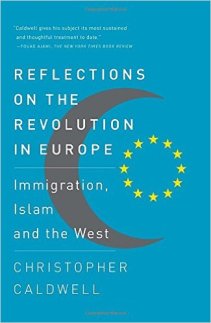Christopher Caldwell’s Reflections on the Revolution in Europe: Immigration, Islam, and the West isn’t a new book, but it’s one that I’m glad I picked up. In fact, the 2010 tome sheds important light on why Britons Brexited and Donald Trump is the United States’ next president.

Caldwell suggests that when European nations began guest worker programs in the post-World War II era, they situated themselves, unknowingly, to become “a continent of migrants.” At the time of its writing, the book claims that of 375 million residents of Western Europe, approximately 40 million non-natives are domiciled in the region. Many of these migrants come from Islamic cultures. This is notable, in that “the Islamic and the Christian worlds have opposed one another, violently at times,” for more than a millennium. The book considers whether Europeans and Islamic immigrants can live together peacefully in the years to come, as well as contemporary socio-political circumstances.
According to Caldwell, less than one-fifth of Europeans believe immigration has had positive results for their nations. Before the reader write Caldwell and his fellow Europeans off as racist, xenophobic, or Islamophobic, it is enlightening to objectively consider immigration’s net effects. Caldwell’s book offers that objective analysis.
Indeed, civil liberties have been restricted for all Europeans in the wake of mass immigration. As authorities have placed radical mosques under surveillance, governing bodies have rolled back privacy rights for all Europeans so as not to viewed as singling out those of a particular religion. (Again, no one wants to be considered a “hater” or “Islamophobe.”) To keep from being overwhelmed by the outcome of family reunification programs (noting that practitioners of the Islamic faith traditionally have far, far higher birth rates than those of generally-secular Europeans), Denmark made it increasingly difficult to gain Danish citizenship, making it tough for even for a native Dane to get citizenship for a foreign spouse.
Although some – Caldwell cites European elites, and I’d cite Hillary Clinton in her latest attempt at becoming president – argue that immigrants bring benefits, particularly in economic form, to their home countries, this has been questionable – at least in Europe’s case. Caldwell writes: “Instead of using their benefits to pay for say, food, [immigrants] may use them to pay for, say, Islam. Two-thirds of French imams are on welfare.” Eventually, Europeans determined that immigrants were threatening the sustainability of their welfare economies.
The result was that elites began couching immigration in terms of moral imperatives. We hear something similar in the United States when people claim we have a moral obligation to admit Syrian refugees. The trouble with arguing that the admission of refugees is a moral imperative means that one cannot pick and choose among those asylum-seekers with the best credentials; one is morally obligated to accept all in need, or at least those in the greatest need (i.e., those worst off). It also means that many of the refugees admitted into Western countries are Islamic. “For Europe, the biggest nearby humanitarian catastrophes and the bloodiest nearby wars were either in the Muslim world (Iran, Iraq, Somalia, Eastern Turkey) or on its borders (the former Yugoslavia).” Further, these people are moving to their new land not to do, but to be. This dynamic has created a situation in which immigrants are coming in great numbers – in entire communities. Rather than assimilation, these many communities coexist within their own subculture.
The next two sections of the book – which I won’t spoil for you here – address Islamic and Western culture. Caldwell tackles difficult questions that make Westerners squeamish, including: Is Islam a peaceful religion? Is tolerance beneficial for its practitioners? Is Western culture in decline? Is Islam more sustainable and attractive than Western culture? I found Caldwell’s analysis truly helpful and balanced. Given that “the clash of cultures” is likely to be a hot topic in 2017, I highly recommend this book!